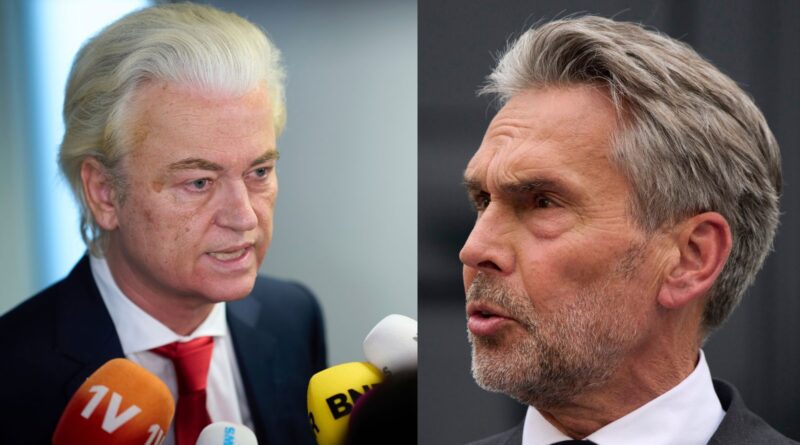Dutch Government Collapses After Geert Wilders Exits Coalition Over Asylum Dispute
“The Dutch government collapses after far-right leader Geert Wilders pulls out of the ruling coalition, triggering fresh political instability in the Netherlands.“
In a major political shake-up, the Dutch government collapses less than a year after it was formed, following Geert Wilders’ decision to withdraw his Party for Freedom (PVV) from the fragile coalition. The collapse came after an intense dispute over immigration and asylum policies, with Wilders demanding tougher measures that his coalition partners were unwilling to endorse.
The decision has led to the resignation of Prime Minister Dick Schoof and the dissolution of the current cabinet, as confirmed in a televised address on June 3, 2025.
“As far as I’m concerned, this shouldn’t have happened,” Schoof said after submitting the cabinet’s resignation to King Willem-Alexander. (Source: BBC)
Why the Dutch Government Collapses: A Deep Policy Divide
The core reason the Dutch government collapses lies in a failed compromise over asylum legislation. Wilders had proposed a set of ten tough measures—including freezing new asylum applications, stopping the construction of reception centers, and restricting family reunification rights. His coalition partners, particularly the VVD, BBB, and NSC, expressed concern over the legal and humanitarian implications of these proposals.
In a short-lived meeting that lasted barely a minute, Wilders announced his party’s exit from the coalition, declaring:
“No signature for our asylum plans. PVV leaves the coalition.” (Source: Reuters)
Prime Minister Schoof Steps Down
Prime Minister Dick Schoof, who was leading the coalition government since July 2024, resigned shortly after Wilders’ announcement. The resignation of the cabinet has triggered the formal collapse of the Dutch government. The ruling alliance—formed between PVV, VVD, BBB, and NSC—was always seen as uneasy due to ideological differences.
Now, the remaining parties are expected to serve in a caretaker capacity until new elections are scheduled, most likely in autumn 2025.
Political Fallout Among Coalition Partners
Reactions from within the government have been swift and critical. Dilan Yesilgöz, leader of the VVD, condemned Wilders’ move as “super irresponsible,” claiming that asylum was being used as a political tool rather than a genuine policy concern. Mona Keijzer of the BBB accused Wilders of betraying national interests, saying:
“I think Wilders is betraying the Netherlands.” (Source: BBC)
Despite the backlash, Wilders appears undeterred. He told Dutch media that he still intends to become the next prime minister and will campaign to expand the PVV’s majority in the upcoming elections.
What This Collapse Means for the Netherlands
With the Dutch government collapsed, the nation now faces months of political uncertainty. This comes at a time when the Netherlands is preparing to host the NATO Summit in The Hague later this month—an event now overshadowed by domestic instability.
Sandra Phlippen, chief economist at ABN AMRO, commented that the collapse would likely have limited economic impact because the government had not enacted any significant reforms during its short term. (Source: NYTimes)
However, the larger issue is political credibility. Analysts argue that Wilders’ actions may alienate potential future coalition partners and complicate any post-election efforts to form a stable government.
“His decision to collapse the government is being seen as reckless,” said Armida van Rij of Chatham House. (Source: BBC)
A Broader European Context
The Dutch government collapse mirrors a broader pattern of political volatility across Europe, where migration and cost-of-living issues continue to fuel division. Far-right parties like the PVV have gained momentum in recent years, but their ability to govern effectively has remained questionable.
If Wilders hopes to lead the country, he may have to moderate his stance to gain the trust of both coalition partners and the electorate. However, his strategy of making asylum policy the centerpiece of his campaign suggests a continued hardline approach.
Conclusion: Dutch Government Collapse Could Redefine the Nation’s Political Future
The Dutch government collapse after less than a year in power exposes not only the fragility of coalition politics in the Netherlands but also the growing influence—and volatility—of far-right populism in Europe. As the country prepares for new elections, the political landscape remains divided and uncertain.
Voters will soon decide whether to reward Wilders for his uncompromising stance or to support more stable, centrist leadership capable of building a lasting coalition. Until then, the Netherlands will be governed by a caretaker cabinet at a critical juncture in its domestic and international affairs.
References:
- BBC News – Dutch government collapses after PVV exits coalition
- Reuters – Far-right leader Wilders quits coalition
- The New York Times – Geert Wilders exits coalition amid policy rift
Would you like a featured snippet version, meta description, or structured data markup for better search engine visibility?

